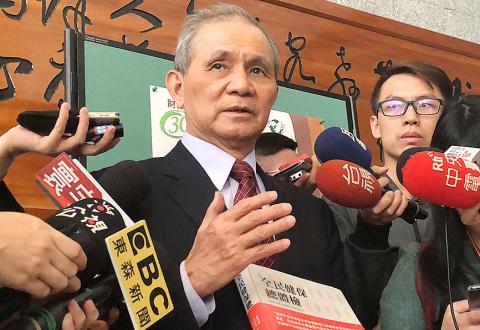The Executive Yuan yesterday announced the names of the leaders and some of the members of the government’s transitional justice promotional committee, saying the list would be sent to the Legislative Yuan for approval once it is complete.
Premier William Lai (賴清德) on Tuesday confirmed that the committee is to be headed by 74-year-old former Control Yuan member Huang Huang-hsiung (黃煌雄), Executive Yuan spokesman Hsu Kuo-yung (徐國勇) told a press conference in Taipei.
“Huang joined dangwai [黨外, “outside the party”] activities in the early days and is a prominent democracy advocate in Taiwan,” Hsu said. “He is widely recognized in political circles as an impartial individual who shows a strong sense of mission toward Taiwan.”

Photo: CNA
Huang is one of the few people who, despite adhering to pro-Taiwanese independence views, could be embraced by both the pan-green and pan-blue camps, which makes him an ideal candidate for the chairmanship, Hsu said.
The committee’s vice chairman is to be Mainland Affairs Council Deputy Minister Chang Tien-chin (張天欽), a legal expert who served on the board of the now-disbanded Improper Martial Law Period Insurgency and Espionage Convictions Compensation Foundation.
Established in 1999 by the Executive Yuan, the foundation was tasked with compensating victims of persecution during the Martial Law period. It handled more than 10,000 cases and awarded about NT$19.6 billion (US$673 million) in compensation before it was dissolved in 2014.
Hsu said Chang’s legal knowledge, coupled with his experience working in the government, supplements Huang’s qualities.
Hsu also named four part-time committee members, including Presbyterian Church in Taiwan assistant director-general pastor Eleng Tjaljimaraw (高天惠), a Paiwan who also sits on the Presidential Office’s Indigenous Historical Justice and Transitional Justice Committee.
Judicial Reform Foundation member Greg Yo (尤伯祥), Academia Sinica Institute of Taiwan History director Hsu Hsueh-chi (許雪姬) and National Taiwan University history professor Hua Yih-fen (花亦芬) were also nominated.
Yo is equipped with a deep sense of justice and has often represented victims of wrongful convictions, Hsu Kuo-yung said, adding that Hsu Hsueh-chi has been deemed a “walking Wikipedia” for Taiwanese history, particularly concerning the 228 Incident and the White Terror era.
Although Hua is also a part-time member of the Cabinet’s Ill-gotten Party Assets Settlement Committee, sitting on both committees would not lead to conflict, Hsu said.
The three full-time members for the transitional justice committee have also been determined, but their names would be announced once they complete administrative procedures at their current posts, Hsu Kuo-yung said.
Under the Act on Promoting Transitional Justice (促進轉型正義條例), the committee should consist of a chairperson, a vice chairperson, three full-time members and four part-time members.
Their tenure is not to expire until after the committee completes its initial task of compiling a detailed investigative report, a plan of action and draft legislation, which it is to do within two years before being dissolved.
228 Incident expert Chen Tsui-lien (陳翠蓮) is rumored to have been among the nominated committee members, but Chinese-language Up Media on Thursday cited an anonymous source as saying that she declined the offer because she believed that Huang did not know enough about transitional justice to head the committee.
Hsu yesterday declined to comment on the report.

Several Chinese Nationalist Party (KMT) officials including Chairman Eric Chu (朱立倫) are to be summoned for questioning and then transferred to prosecutors for holding an illegal assembly in Taipei last night, the Taipei Police said today. Chu and two others hosted an illegal assembly and are to be requested to explain their actions, the Taipei City Police Department's Zhongzheng (中正) First Precinct said, referring to a protest held after Huang Lu Chin-ju (黃呂錦茹), KMT Taipei's chapter director, and several other KMT staffers were questioned for alleged signature forgery in recall petitions against Democratic Progressive Party (DPP) legislators. Taipei prosecutors had filed

Taiwan would welcome the return of Honduras as a diplomatic ally if its next president decides to make such a move, Minister of Foreign Affairs Lin Chia-lung (林佳龍) said yesterday. “Of course, we would welcome Honduras if they want to restore diplomatic ties with Taiwan after their elections,” Lin said at a meeting of the legislature’s Foreign Affairs and National Defense Committee, when asked to comment on statements made by two of the three Honduran presidential candidates during the presidential campaign in the Central American country. Taiwan is paying close attention to the region as a whole in the wake of a

NEW WORLD: Taiwan is pursuing innovative approaches to international relations through economics, trade and values-based diplomacy, the foreign minister said Taiwan would implement a “three-chain strategy” that promotes democratic values in response to US tariffs, Minister of Foreign Affairs Lin Chia-lung (林佳龍) said. Taiwan would aim to create a “global democratic value chain,” seek to capitalize on its position within the first island chain and promote a “non-red supply chain,” Lin was quoted as saying in the ministry’s written report to the Legislative Yuan submitted ahead of the legislature’s Foreign Affairs and National Defense Committee meeting slated for today. The Ministry would also uphold a spirit of mutual beneficial collaboration, maintaining close communication and consultations with Washington to show that Taiwan-US cooperation

Taiwan and the US have begun trade negotiations over tariffs imposed by US President Donald Trump earlier this month, Minister of Foreign Affairs Lin Chia-lung (林佳龍) said in an interview this morning before reporting to the Legislative Yuan’s Foreign Affairs and National Defense Committee. The Taipei Economic and Cultural Representative Office (TECRO), Taiwan’s de facto embassy in the US, has already established communication channels with the US Department of State and the US Trade Representative (USTR), and is engaging in intensive consultations, he said. Points of negotiation include tariffs, non-tariff trade barriers and issues related to investment, procurement and export controls, he